MUG prizes for LMU early-career researchers
15 Jul 2025
This year, six doctoral graduates and two habilitation graduates are receiving awards from the Munich University Association.
15 Jul 2025
This year, six doctoral graduates and two habilitation graduates are receiving awards from the Munich University Association.
Each year, the Munich University Association (Münchener Universitätsgesellschaft) awards prizes to young researchers from a wide range of disciplines for their outstanding dissertations and habilitations. This year, the topics range from innovative methods for the early detection of cancer to the question of whether new risks posed by artificial intelligence (AI) require new legal concepts.
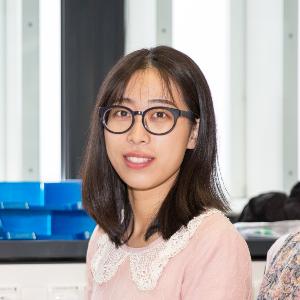
© Michael Till
Dr. Shubo Zhao, Faculty of Chemistry and Pharmacy, has received a doctoral award for her dissertation “Cellular responses to nucleic acid-protein crosslinks.”
DNA and RNA are the primary carriers of genetic information – and are constantly exposed to damage from UV radiation and metabolites. In her doctoral thesis, Zhao investigated how cells respond to damage to DNA and RNA. She discovered a new mechanism that cells use to regulate the activity of an important DNA repair enzyme. At the same time, she established a new research direction in the cellular response to RNA damage – a poorly understood field.
To facilitate her investigations, Zhao developed a method to specifically induce RNA damage in cells. In the process, she demonstrated that such damage is highly toxic and uncovered a novel cellular mechanism for resolving damaged RNA. Her dissertation provides new insights into how cells deal with damaged RNA and has significantly shaped an emerging research field. After completing her postdoctoral research, Zhao was appointed to an associate professorship at Jilin University in China and is currently working as a visiting scientist at LMU.
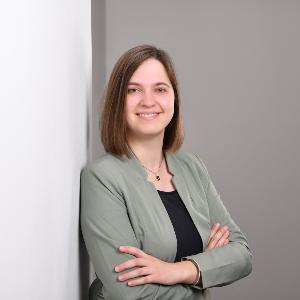
© Heidi Foto GmbH
Dr. Andrea Franziska Böhnisch, Faculty of Geosciences, has been awarded a doctoral prize for her dissertation “Structures of atmospheric hazards in Europe.”
In her doctoral thesis, Andrea Böhnisch investigates how heatwaves and droughts in Europe are changing under the influence of natural climate fluctuations and global warming. Increasingly, these hazards are occurring simultaneously and presenting great risks for humans and the environment. Böhnisch’s dissertation focuses on climatic interactions, heat and drought patterns, and compound events – that is, simultaneously hot and dry periods.
For her analysis, she employs modern climate modeling methods, especially so-called SMILEs – large ensembles of climate simulations with slightly varied initial conditions. This allows her to carry out detailed simulations of future developments and obtain new insights into the dynamics and variability of extreme climate events. Her results improve our understanding of climate risks and provide an important foundation for regional adaptation strategies. Böhnisch’s dissertation is an important contribution to climate research and the practical assessment of heat and drought risks in Europe.
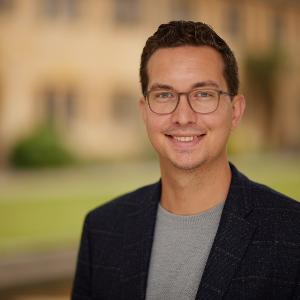
© David Fisher (Fisher Studios)
Dr. Tim Heinkelmann-Wild, Faculty of Social Sciences, has been granted a doctoral award by the Munich University Society for his dissertation, After Exit: Alternative Leadership and Institutional Resilience after Hegemonic Withdrawal.
What is the relationship between state power and international order? How can international institutions cope with the withdrawal of a hegemonic power which they have created, supported, and shaped over many years? Tim Heinkelmann-Wild poses these highly topical questions in his dissertation and develops a leadership transition theory, which furnishes a persuasive explanation for the differential resilience of international institutions.
Empirically, the thesis investigates a comprehensive database on the withdrawal of the United States from international organizations and treaties after 1945 as well as case studies on the resilience of various institutions. The author shows, for example, that the withdrawal of the US from the World Health Organization (WHO) need not constitute a death blow. Rather, international institutions can survive the withdrawal of hegemonic powers if alternative leading powers such as the EU step in to fill the vacuum.
Tim Heinkelmann-Wild is a research fellow at LMU’s Geschwister Scholl Institute of Political Science and currently a visiting scholar in the Department of Politics and International Studies (POLIS) at the University of Cambridge.
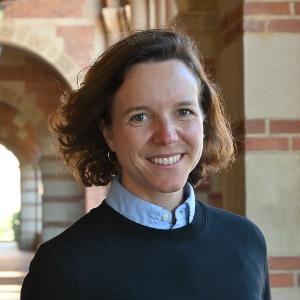
© UCLA / Yue Wang
Dr. Stephanie Frenz-Wießner, Faculty of Medicine, has been awarded a doctoral prize for her dissertation, Stem cell-derived bone marrow organoids to model pediatric bone marrow failure syndromes.
Which genes and signaling pathways control the differentiation and functioning of the human blood and immune system? To further decipher these questions, Stephanie Frenz-Wießner researched a newly identified genetic defect associated with inherited bone marrow failure in her doctoral thesis. To investigate the cellular mechanisms within a model of the bone marrow niche, she created an innovative protocol for the generation of human stem cell-derived bone marrow organoids. The novel technology has been patented and provides a transformative platform for studying the basic biology of hematopoiesis and a broad spectrum of congenital and acquired diseases such as congenital bone marrow failure and childhood leukemias.
Stephanie Frenz-Wießner currently works as a postdoc in the Broad Stem Cell Research Center at UCLA in Los Angeles.
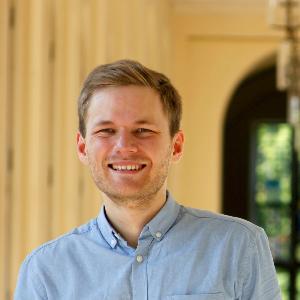
© Reiner Anselm
Bertolt Bundschuh, Faculty of Protestant Theology, has been recognized for his dissertation, “’It’s true that people must have something to call their own, but (…)’ Protestant conceptions of property between 1890 and 1914.”
In his dissertation, Bertolt Bundschuh investigates Protestant ideas about property in the German Empire. On the basis of historical discourse analyses, intellectual and social history approaches, and systematic ethical research, he develops a distinct Protestant conception of property that goes beyond traditional concepts. Property is understood here no longer just as legally protected possession, but as a social practice – embedded in a network of rights, obligations, and social functions, as a community of responsibility spanning generations. Bundschuh normatively reconceptualizes property in terms of liminal goods – such as ecological resources or digital information – and thus contributes to current ethical debates on subjects like climate justice and the socially just organization of common property.
Bertolt Bundschuh has been a vicar in the South-West Neighborhood of Parishes in Frankfurt am Main since earlier this year.
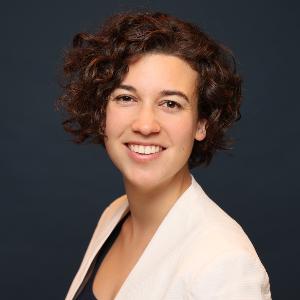
© PicturePeople
Dr. Ariane Hallermayr (Ph.D.), Faculty of Medicine, has received an award for her dissertation, Assessment of genome-wide somatic copy number alterations in combination with driver mutation analysis in circulating DNA of colorectal cancer patients.
Colorectal cancers are among the three most common tumor diseases worldwide and are the second most frequent cancer-related cause of death. Precise early detection and disease monitoring are decisive for successful treatment, but this has been possible to date only through macroscopic evidence from imaging techniques or endoscopy. Ariane Hallermayr devoted her doctoral thesis to researching liquid biopsy, an innovative approach for the analysis of circulating tumor DNA from plasma. By means of a simple blood collection, doctors can analyze various circulating tumor markers, which correlate directly with the tumor burden and allow real-time monitoring.
As many tumors do not exhibit any known mutation-specific markers, Ariane Hallermayr developed a new approach that permits the analysis of characteristics like copy number alterations, chromatin signatures, and fragmentation patterns through whole genome sequencing. This method also works in very early tumor stages. The goal now is to optimize a machine learning algorithm for the detection of colorectal cancers and adapt it to other tumor entities such as breast cancer.
Ariane Hallermayr is Head of Research & Development at the Medical Genetics Center (MGZ) in Munich.
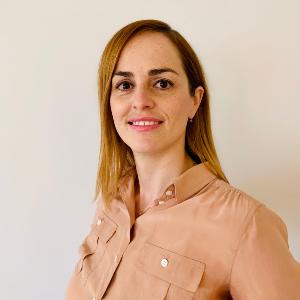
© Peter König
Privatdozentin Dr. Victoria Ibold, Faculty of Law, has been awarded a prize for her habilitation thesis “Artificial intelligence and criminal law – On criminal product responsibility in our innovation society.”
In her habilitation thesis, Victoria Ibold investigates how the use of artificial intelligence (AI) affects existing responsibility structures under criminal law. The focus is on whether new risks arising from AI require new criminal law concepts, such as in the case of autonomous systems. Victoria Ibold takes a particularly close look at criminal product responsibility – that is, liability for damage caused by AI products.
She does not limit her analysis to legal questions or specific use cases of AI. Instead, she combines the technical foundations of AI, doctrines of criminal law, constitutional law, European regulations – especially the new AI Act – and considerations from the philosophy of technology to an interdisciplinary overall approach. With her habilitation thesis, Ibold lays down a solid basis for dealing with AI systems in modern society from the perspective of criminal law – an important contribution to the legal classification of technological developments.
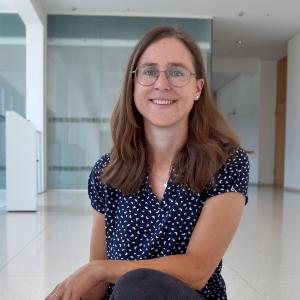
© Daniela Diefenbacher, BMC
Privatdozent Dr. Linda Franziska Böswald, Faculty of Veterinary Medicine, has received an award for her habilitation project “Animal nutrition in laboratory animal science.”
In her dissertation, Linda Böswald studied how nutrition influences physiological parameters in laboratory animals. Among other things, she showed how the processing of animal feed affects the digestibility of starch, and the composition of the gut microbiome. Furthermore, she investigated the activity of digestive enzymes in different lab rodent species – setting new standards in laboratory animal nutrition.
In her own project, which is being funded by the German Research Foundation, she expanded her research to pigs – a model animal with growing importance in biomedical research. Her results help improve the quality of animal testing studies while also reducing the strain on animals. Today, Böswald leads the Core Facility Animal Models at the BMC, LMU and the research group for Translational and Comparative Nutrition in this facility. Her current research on the gut microbiome-brain axis in an Alzheimer’s model is being funded by the Excellence Initiative.